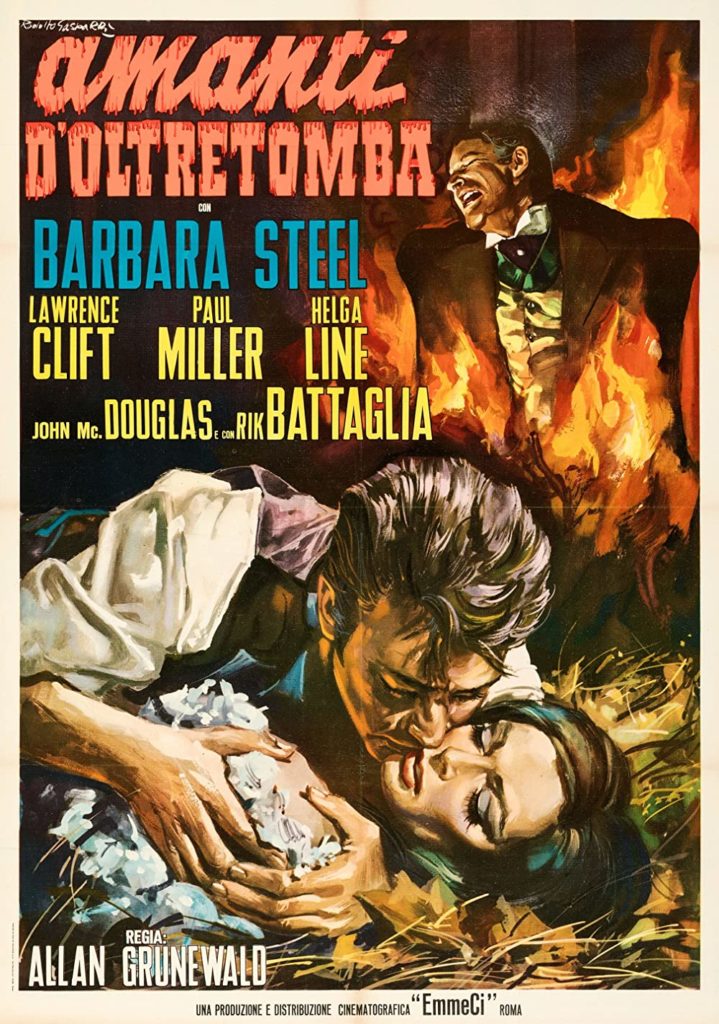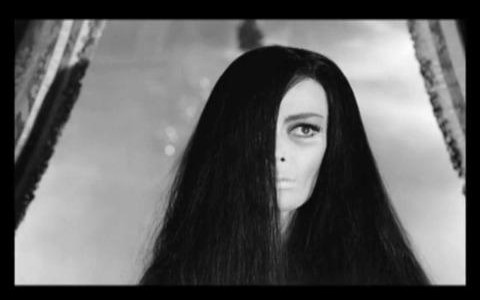Barbara Steele became a staple of Italian gothic horror and for many good reasons. Steele is a wide-eyed charming brunette who can play a coquette or an ingénue with ease. She commands attention and has excellent screen presence. She’s the sort of actress who is compellingly watchable. However, many of Steele’s best performances and most memorable films have become somewhat obscure to contemporary audiences. Most know the genius of Mario Bava’s BLACK SUNDAY, yet they are unaware of THE LONG HAIR OF DEATH, CASTLE OF BLOOD, THE GHOST, TERROR CREATURES FROM THE GRAVE, and others. Her body of gothic horror work is impressive. It wouldn’t be wrong to consider her a female counterpart to the likes of Christopher Lee and Peter Cushing, who also were in a great deal of gothic films.
Another thing about Barbara Steele is that she often played dual roles or roles that contained themes of duality, ghosts, and adulteresses. There are two films where her character and her lover abscond to the estate’s greenhouse to have a blissfully hot makeout sesh among the plants. (New fantasy unlocked? Maybe.) One of those films just so happens to be NIGHTMARE CASTLE, a film that is devious and fun and deserves more attention as a worthy entry of Italian gothic horror.

For a film from 1965, it’s kind of radical in that it doesn’t demonize Steele’s Muriel for her extramarital activities. In fact, you could say the film is sympathetic to her and even sides with her character. Muriel Arrowsmith is in a languishing marriage to Dr. Stephen Arrowsmith, who seems to like Muriel’s money and castle more than he likes Muriel herself. Muriel is carrying on a lusty affair with the estate’s gardener. Stephen soon catches, captures, and tortures Muriel and her lover before killing them horrifically. Again, Muriel is cast in a sympathetic light and is admirably defiant even in her last moments. Stephen in turn uses the blood of Muriel and her lover to revive their maid Solange’s youth. It’s important to note that Stephen has been carrying on an affair with Solange and is a complete money grubbing hypocrite with some weird side experiments. In an interesting turn of events, Stephen does not inherit Muriel’s fortune or her castle. Muriel changed her will and left the money and estate to her mentally unstable step sister Jenny (played by, you guessed it, Barbara Steele). Stephen, of course, takes it upon himself to marry Jenny and subsequently drive her insane so all of Muriel’s wealth and property can finally be his. Solange is all too eager to help. That is until the audience learns that Muriel and her lover linger in the castle as ghosts, hungry for vengeance.
This is a gothic horror for those who love revenge and morally ambiguous women. Steele is her own foil in this as both the seductive and strong-willed Muriel and the fragile and sweet Jenny. Muriel’s confident sexual agency contrasts greatly with Jenny’s budding sexuality. Sex and repression are themes that the gothic explores over and over, but it’s interesting to see a film with such an earnest juxtaposition that presents the women in a non-judgmental way. They’re the proverbial Madonna and Whore duo without any of the sickening moralistic tripe. Both women are portrayed as inherently interesting characters that Stephen grossly underestimates. They’re far from simple creatures and unwitting sugar mamas. Muriel, even from beyond the grave, is smarter than Stephen will ever be, and he never takes into account that Jenny may have desires of her own, particularly her fancying her doctor, Dr. Derek Joyce.
It would be apt to say that this film deals with dichotomies, extremes, and hypocrisies. Passion is made stark against the landscape of cold indifferent scheming. Morality, in the process, becomes hopelessly muddled as Jenny falls into a role that echoes Muriel’s, the wife to a lecherous and vindictive man. This makes the dual casting of Steele even more symbolic and interesting. Jenny is on the brink of entering into an affair with Dr. Joyce while Stephen is wrapped up in his own machinations. Stephen takes little issue with his own extramarital affairs, using his dead wife’s blood to revive his lover’s youth. Irony is lost on the arrogant man, certain that his plans will not fail.
The concepts of marriage and devotion become more muddled than the idea of morality is. Ideally, marriage and devotion should be intrinsically linked. Muriel and Jenny’s respective marriages to Stephen are more like business transactions than unshakeable bonds. The women are used more so than loved, and this creates a nearly perfect environment for affairs to blossom. Love for these women is found outside of marital discontent and social acceptance. This is still taboo today due to outdated ideas on gender persist. Muriel exists outside the subservient bounds of traditional marriage and takes a lover as boldly as her husband does. It brings us back to the idea of agency, the strong will that literally cannot be killed. Stephen killed Muriel’s body, but he wasn’t able to eradicate her essence. Stephen thinks he has done nothing wrong because society has reinforced the ideas of male superiority and toxic gender tropes.
Gothic horror never seems to stray too far from the topic of gender politics and NIGHTMARE CASTLE is no different in this aspect. Interactions between husbands, wives, and lovers are put under microscopes. Yes, there are fantastical plots, but it’s difficult not to notice that this is a recurring theme across the gothic. Romance, dissatisfaction, marriage, and agency continue to creep up in gothic horror today even. It begs the question, why gothic horror isn’t taken more seriously due to its meditations on gendered paradigms. The thematic content might not be as prominent as your average A24 horror film, but films like NIGHTMARE CASTLE and even THE WHIP AND THE BODY are far from the prettily shot trash viewers claim it to be. There’s a space in intersectional feminist criticism for closer examinations of films like these. While there have been writings and numerous studies on what is deemed the “female gothic” this is almost strictly limited to literature and looking at works by women instead of a broad study that includes the depiction of women within the gothic. (Think criticism that sticks to the mainstays of Shelley and the Brontes.) Perhaps, we can all rethink how we approach these gendered elements within the genre and broaden the horizons of this sect of critique.
Like way too many gothic horror films out there, NIGHTMARE CASTLE flies under the radar despite being a miraculous example of Italian gothic. Barbara Steele shines in this story of madcap betrayal and pronounced duality. Sure, it is a perfectly entertaining film. It’s downright fun. Steele is having the time of her life terrorizing and being terrorized. However, like most gothic media it looks at societal mores amidst more bombastic elements of the plot. You can have your cake and eat it too in this case. That’s what’s continually fascinating about the gothic, it — like most horror — acts as an entertaining social mirror, reflecting back the issues that have plagued us all over time and space.
Tags: Barbara Steele, blood, Columns, Ennio Morricone, Enzo Barboni, Fabio De Agostini, Ghosts, Giuseppe Addobbati, Helga Liné, Horror, Italy, Marino Masé, Mario Caiano, nightmares, Paul Muller, Renato Cinquini, Rik Battaglia



No Comments